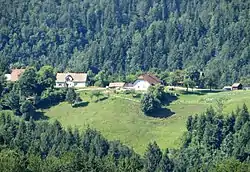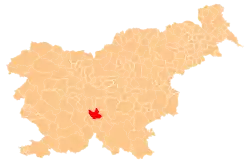Bukovec, Velike Lašče
Bukovec (pronounced [ˈbuːkɔʋəts]; in older sources also Bukovica,[2] German: Bukowitz[2]) is a small remote settlement in the hills on the edge of the Municipality of Velike Lašče in Slovenia. Traditionally the area is part of the Lower Carniola region. It is now included in the Central Slovenia Statistical Region.[3]
Bukovec | |
|---|---|
 | |
 Bukovec Location in Slovenia | |
| Coordinates: 45°51′8.49″N 14°30′18.98″E | |
| Country | |
| Traditional region | Lower Carniola |
| Statistical region | Central Slovenia |
| Municipality | Velike Lašče |
| Area | |
| • Total | 3.01 km2 (1.16 sq mi) |
| Elevation | 682.2 m (2,238.2 ft) |
| Population (2002) | |
| • Total | 5 |
| [1] | |
Name
The name Bukovec is derived from the common noun bukev 'beech'. Like similar toponyms in Slovenia (e.g., Bukovica, Bukovo, Bukovje), it originally referred to the local vegetation.[4] In the past the German name was Bukowitz.[2]
History
During the Second World War, the Partisans often took refuge in Bukovec and the commands of various Partisan brigades operated in the area. On 22 March 1942, Italian forces burned all of the houses in the village.[5]
Mass graves
Bukovec is the site of three known mass graves associated with the Second World War. The Mačkovec Mass Grave (Slovene: Grobišče Mačkovec) is located in the woods southeast of the settlement. Its location is marked by crosses cut into the trunks of two trees. It contained the remains of about 40 prisoners of war, mostly members of the Anti-Communist Volunteer Militia, that were taken from the prison in Ribnica and murdered at the site on 27 or 28 October 1943 by the Partisan Loka Brigade.[6][7][8] In October 2013 the remains were disinterred and reburied at the cemetery in Begunje pri Cerknici.[9][10] The Italian Soldiers Mass Grave (Grobišče italijanskih vojakov) is located in the woods south of Bukovec, below the north slope of Mačkovec Hill. It contains the remains of Italian soldiers.[8][11] The Romani Mass Grave (Grobišče Romov) is located in the woods south of Bukovec near the Janez Klančar Grave in the territory of neighboring Selo pri Robu, which is marked with a cross. It contains the remains of Romani murdered at the site[8][12] by a Partisan group led by Stane Semič.[13]
References
- Statistical Office of the Republic of Slovenia
- Leksikon občin kraljestev in dežel zastopanih v državnem zboru, vol. 6: Kranjsko. 1906. Vienna: C. Kr. Dvorna in Državna Tiskarna, p. 44.
- Velike Lašče municipal site
- Snoj, Marko. 2009. Etimološki slovar slovenskih zemljepisnih imen. Ljubljana: Modrijan and Založba ZRC, p. 86.
- Savnik, Roman, ed. 1971. Krajevni leksikon Slovenije, vol. 2. Ljubljana: Državna založba Slovenije, p. 404.
- Ferenc, Mitja (December 2009). "Grobišče Mačkovec". Geopedia (in Slovenian). Ljubljana: Služba za vojna grobišča, Ministrstvo za delo, družino in socialne zadeve. Retrieved April 6, 2020.
- Ferenc, Mitja (2005). Prikrito in očem zakrito: prikrita grobišča 60 let po koncu druge svetovne vojne. Celje: Muzej novejše zgodovine Celje. p. 120.
- "Odlok o občinskem prostorskem načrtu Občine Velike Lašče" (PDF). Uradno glasilo Občine Velike Lašče. 7: 17. 2013. Retrieved April 7, 2020.
- "Žrtve poboja na Mačkovcu bodo položene v grobove." 2013. RTV SLO, 26 October. (in Slovene)
- Bartolj, Jože, & Jože Dežman. 2013. "Začetek prekopa žrtev iz Mačkovca." Radio Ognjišče, 26 October. (in Slovene)
- Ferenc, Mitja (December 2009). "Grobišče italijanskih vojakov". Geopedia (in Slovenian). Ljubljana: Služba za vojna grobišča, Ministrstvo za delo, družino in socialne zadeve. Retrieved April 6, 2020.
- Ferenc, Mitja (December 2009). "Grobišče Romov". Geopedia (in Slovenian). Ljubljana: Služba za vojna grobišča, Ministrstvo za delo, družino in socialne zadeve. Retrieved April 6, 2020.
- Strle, France. 1980. Tomšičeva brigada: Uvodni del. Ljubljana: Partizanska knjiga, p. 271.
